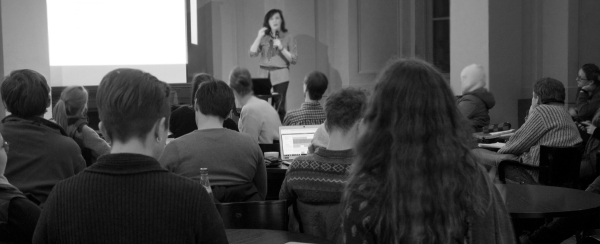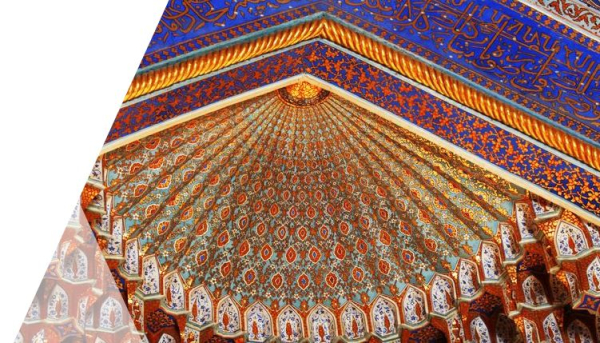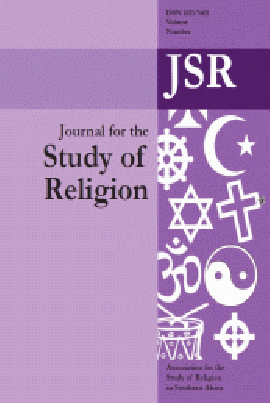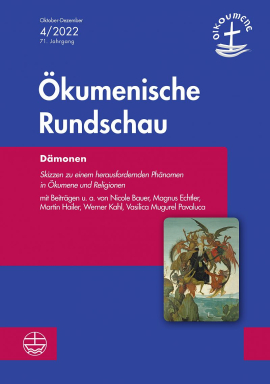|
If the newsletter does not display properly, please click here. |

|
|||||
|
|||||
|
Dear friends and colleagues, Next week we will continue with our colloquium – this time with our Senior Research Fellow Uta Karstein. On 9 and 10 March we will host the workshop on “Who is ‘Us’: Our Culture, our Values, our Heritage and the Reconfiguration of Religion”, convened by Leibniz Professor Lori Beaman and our KFG and in this context we would like to announce a Call for Abstracts for a PhD workshop. Moreover, we would like to share with you new publications by a KFG member as well as recommendations for a lecture, a conference and several job opportunities. |
|||||
|
We would also like to remind you that tonight we will be showing the film “Midwives” at Cinémathèque Leipzig at naTo as part of our Screening Religion Series. The film observes two women – Hla, a Buddhist and the owner of an improvised clinic in western Myanmar and Nyo Nyo, a Muslim woman and trained midwife who works as an assistant and translator at the clinic – as they face their daily challenges, but also how they pursue their hopes and dreams in the midst of an environment where chaos and violence are constantly growing. After the film there will be a discussion and an information desk organized by the non-profit association Burmahilfe Leipzig e.V. Tonight | 7 pm (CET) Cinémathèque Leipzig at naTo, Karl-Liebknecht-Straße 46, 04275 Leipzig |
|||||
|
Already in two days, the KFG workshop on “Religion and its History in Turkey: New Approaches, Alternative Perspectives” will take place, convened by Markus Dreßler and Gökçen Beyinli. Registrations for participation on site or online are still possible by sending an e-mail to multiple-secularities@uni-leipzig.de. Enjoy and have a good week! Anja & Lucy |
|||||

|
|||||
Next week’s Colloquium: Uta Karstein on “Urban Space, Functional Differentiation, and Conditions of Religious Place-Making in 19th-Century German and British Cities”, 1 FebruaryNext Wednesday, we will make up for the colloquium with our Senior Research Fellow Uta Karstein already announced for December. She will give a presentation on the topic “Urban Space, Functional Differentiation, and Conditions of Religious Place-Making in 19th-Century German and British Cities”. The colloquium will take place in a hybrid format (on-site and online). If you would like to join in person, please register for the colloquium via e-mail. In the Member Area you will find the relevant readings as well as information on the zoom connection data.
Strohsack, Room 4.55 and online via zoom |
|||||

|
|||||
KFG Workshop and Call for Abstracts for PhD Workshop: “Who is ‘Us’: Our Culture, our Values, our Heritage and the Reconfiguration of Religion”, 9–10 MarchWe are looking forward to our workshop on “Who is ‘Us’: Our Culture, our Values, our Heritage and the Reconfiguration of Religion” on 9 and 10 March, hosted by our Associate Member and Leibniz Professor Lori Beaman from the University of Ottawa together with our directors Christoph Kleine and Monika Wohlrab-Sahr. Building on previous discussions of culturalization by the Multiple Secularities research group, this workshop focuses on the transubstantiation of religion to culture in countries characterized by an historical Christian majority (in some cases a consequence of colonialism) and a contemporary decline in religious affiliation. In the context of this workshop, we invite graduate students to present and discuss their work on the relationship of Religion and Culture in a designated panel. We are especially interested in the transubstantiation of religion to culture. We are concerned with practices and symbols one encounters in the course of day-to-day life: symbols such as crosses and crucifixes in social institutions, prayers in public spaces and even extended claims to culture which are compatible with majoritarian Christianity (eating pork as part of who ‘we’ are, for example). Finally, the rise of the culture and heritage narrative coincides with, in some cases, a reconstituted nationalism. It plays a central role in populist movements which link the ideas of traditional culture – often associated with religious symbols – being under threat with a turn against “foreign” influences, may it be Islam or groups promoting sexual liberties. We are interested in your perspectives on these, but also on all other social constructions of boundaries that relate to the religion to culture reconfiguration. Please send a short abstract (max. 500 words) and a CV via e-mail by 13 February. The Workshop will take place as a hybrid event. If you wish to attend, please send a short inquiry via e-mail.
Workshop Dates: 9–10 March Hybrid Event: Leipzig University and online
|
|||||
|
|||||
|
|||||

|
|||||
Lecture by Dorothee Lauer on „Wie aber verhält es sich mit den Einwirkungen durch Zauberei? Frühe muslimische Philosophen und ihre Haltung zu den okkulten Wissenschaften“ (“But what about the effects of sorcery? Early Muslim Philosophers and their attitude to the occult sciences”, Leipzig University, 26 JanuaryWe would like to draw your attention to a lecture given at the Oriental Institute at Leipzig University: Dorothee Lauer is researching the “Influence of early Islamic philosophers on Islamic magic using the example of the Ġāyat al-ḥakīm and the Šams al-maʽārif al-kubrā” at the Göttingen Seminar for Arabic Studies/Islamic Studies. Under the umbrella term ”the sciences of the hidden” (ʿulūm al-ġaib), various practices are subsumed in the Islamic tradition that involve belief in the efficacy of supernatural powers. Her lecture sheds light on the question of the perception and assessment of the occult sciences by the three philosophers al-Kindī (d. 861 or 866), al-Fārābī (d. 950) and Ibn Sīnā (d. 1037) and the importance they attached to these disciplines in the canon of science. If you would like to join the lecture or have any questions, please send an e-mail.
26 January | 6.30 pm (CET) Leipzig University, Oriental Institute, Schillerstraße 6, Room M104
|
|||||

|
|||||
Job opportunity I: Doctoral student and postdoc student for project on “Religious Text Production and Identity Formation in China, 17th to 21st Centuries”We would like to share with you several job opportunities: The project “Religious Text Production and Identity Formation in China, 17th to 21st Centuries”, funded by the DFG and ANR, in a scheme for bilateral cooperation for the period July 2023-June 2026, is welcoming applications for two positions for the duration of the project: one doctoral student, based in Leipzig, and one postdoctoral researcher, based in Paris. The two principal investigators are our Senior Research Fellow Philip Clart from Leipzig University and Vincent Goossaert from the École pratique des hautes études in Paris.
Online interviews, final decision: late March – early April Starting date: 1 July
|
|||||
Job opportunity II: Research Fellow at Orient-Institut Istanbul of the German Max Weber FoundationThe Orient-Institut Istanbul of the German Max Weber Foundation is seeking to fill the position (full-time) of a research fellow. Prerequisites comprise a PhD in the subject spectrum of Turkish Studies, Islamic Studies, Iranian Studies, History, Sociology, Cultural Anthropology, Literature and Linguistics or in related subject areas with regional relevance as well as a postdoc project in the field of “Science, Technology, and Society” with a central contemporary or historical reference to the region researched by the Institute (Turkey, Iran, Caucasus, Turkic-speaking countries, Ottoman and post-Ottoman South-Eastern Europe).
Starting date: 1 April
|
|||||

|
|||||
The International Society for the Study of Religion, Nature and Culture (ISSRNC) Hybrid Conference 2023 on “After Earth? Religion and Technology on a Changing Planet”, 2–5 FebruaryThe International Society for the Study of Religion, Nature and Culture (ISSRNC) has now announced the 2023 Online Program for the hybrid conference on “After Earth? Religion and Technology on a Changing Planet”. The deadline for online registration is 30 January. Student registration is free. Questions about conference registration can be directed to the conveners via e-mail.
Hybrid Event: Tempe/Arizona AND Online
|
|||||
|
If you have any content that you think suits the purpose of the weekly, please feel free to send it to us at multiple-secularities@uni-leipzig.de. |
|||||
|
Kolleg-Forschungsgruppe "Multiple Secularities - Beyond the West, Beyond Modernities" Nikolaistraße 8-10, 04109 Leipzig Mail: multiple-secularities@uni-leipzig.de |

